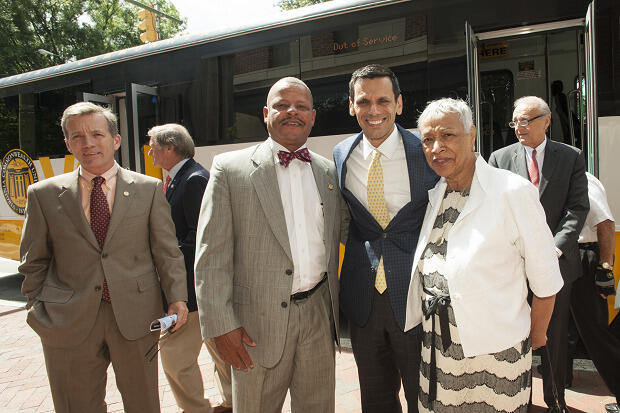
June 16, 2015
VCU hosts lawmakers to showcase priority capital projects
The projects include a new home for the School of Allied Health Professions, expanded research space for the School of Engineering, and STEM lab space for the College of Humanities and Sciences
Share this story
Virginia Commonwealth University hosted the House Appropriations Committee on Monday for the final leg of a cross-state listening tour to hear about needed capital projects at Virginia's universities and other public institutions.
Prior to holding its meeting in the Academic Learning Commons, the committee spent the morning taking a bus tour of the Monroe Park and MCV campuses as VCU President Michael Rao, Ph.D., highlighted the university's top three priority projects.
VCU's No. 1 capital priority, Rao said, is a new home for the School of Allied Health Professions, which educates health care practitioners in the fields of nurse anesthesia, physical therapy, gerontology, radiation sciences and more.
"This is one of our top-ranked schools. For years, it's been the No. 1 nurse anesthesia program in the country," Rao said. "[But] it's absolutely, positively as spread out as it could be across five different buildings. It's not ideal."
Cecil Drain, Ph.D., dean of the School of Allied Health Professions, said the allied health professions make up the majority of the health care workforce, and VCU anticipates the school will need to boost capacity in order to keep up with demand.
"Virginia is going to grow by 2 million and we supply 60 percent of the practitioners in hospitals," he said. "To give you a great example, the [Department of] Physical Therapy gets 1,000 applications for 54 slots. We have no place to grow. We need to increase."
Another priority project is an expansion of the VCU School of Engineering, with an emphasis on research space.
The project, VCU officials said, would also stress pharmaceutical manufacturing, building on research breakthroughs pioneered by B. Frank Gupton, Ph.D., research professor and chair of the Department of Chemical and Life Science Engineering, and supported by the Bill & Melinda Gates Foundation and the U.S. Department of Defense's Defense Advanced Research Projects Agency.
"It would increase by significant sums the volume of much-needed drugs while also of course significantly reducing the cost," Rao said.
The project embodies VCU's ideal of "making it real," Rao said.
"We've decided we're not interested in sort of keeping up with all the other research universities that have been around for years," he said. "Our brand of research is much more geared toward 'making it real.' So a very short timeline to the marketplace or to the bedside or to making improvements to peoples' lives."
The final project that VCU officials highlighted was a 120,000-gross-square-foot expansion of STEM teaching labs that would include lab space for the departments of Chemistry, Biology, Mathematics, Forensic Science, Kinesiology and Health Science, and Physics in the College of Humanities and Sciences.
"We can't really address in an ongoing and sustainable manner [Virginia's] economic development and workforce issues without well-trained undergrads in the sciences."
"We can't really address in an ongoing and sustainable manner [Virginia's] economic development and workforce issues without well-trained undergrads in the sciences," said Jay Bonfili, interim vice president for finance and administration. "This [project will] create human beings who are well prepared to enter that STEM workforce."
Featured image at top: From left: Del. Chris Jones, chairman of the House Appropriations Committee; Del. Luke E. Torian; VCU President Michael Rao, Ph.D.; and Del. Mayme E. Bacote step off the bus after taking a tour of VCU's campuses.
Subscribe for free to the weekly VCU News email newsletter at http://newsletter.news.vcu.edu/ and receive a selection of stories, videos, photos, news clips and event listings in your inbox every Thursday. VCU students, faculty and staff automatically receive the newsletter
Subscribe to VCU News
Subscribe to VCU News at newsletter.vcu.edu and receive a selection of stories, videos, photos, news clips and event listings in your inbox.













